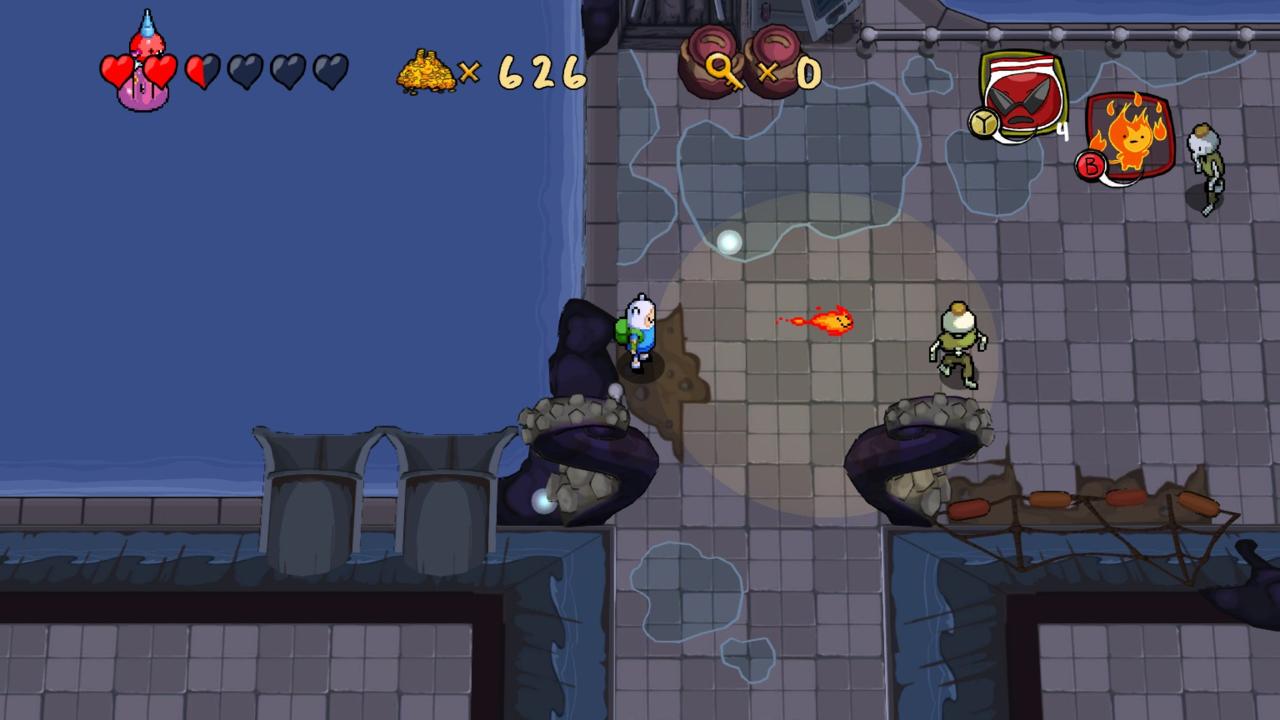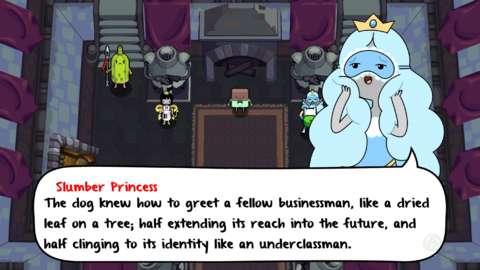Adventure Time: The Secret of the Nameless Kingdom is a Legend of Zelda clone, through and through. Its overhead perspective, sword-swinging combat, multi-floored dungeons, and item-based progression go beyond simply hinting at the game's roots; they beat you over the head with them. It's far from inventive, but being a clone doesn't necessarily sap a game of its merit. The Secret of the Nameless Kingdom is a well-executed replica of a formula that isn't seen all that often outside of Hyrule, and while a persistent lack of direction leads to frustrations, Adventure Time still stands above the heap of insipid licensed games so often rushed out the door.
It might not be as grandiose as A Link to the Past or The Minish Cap, but the Secret of the Nameless Kingdom provides a similarly satisfying experience on a smaller scale. Three temples are located at opposite ends of the overworld, each housing locked rooms, new items that let you progress to different locations, and a final boss that's more of a puzzle than a test of combat proficiency. You're often asked to make use of whatever fresh ability you come across-- whether it be a glove that lets you push heavy objects or a fire spell you shoot across the screen--eliminate your target and save a princess being held in captivity.

The combat is basic at best, but what makes these encounters so enjoyable is discovering your enemy's weak spot. Desperately swinging your sword at a boss's armored gullet is fruitless, so you instead play around with the environment, your enemy's patterns, and the equipment you have at hand to get the job done. The Zelda parallels go beyond the temples. Bushes can be chopped down for loot, treasure chests open to reveal keys and heart pieces, and your boomerang stuns creatures when it makes contact--everything you'd expect from a game of this nature is here. There's even a familiar camera scroll as you move from screen to screen, and somehow, that sense of familiarity is almost comforting. What could feel like a knockoff instead arrives as a breath of fresh air, and, of course, Adventure Time's wacky personality adds a touch of distinctiveness to the journey.
Finn and Jake are the stars, with popular characters from the TV show like the Ice King and Choose Goose acting as quest-givers. As you'd guess, nothing about these activities is traditional. In no other game are you asked to capture a fart in a plastic bag and release it to make a talking Cinnamon Bun laugh so hard he jumps off a bridge, but that's the norm here. It's absurd, yet this frivolity isn't as prevalent as what is seen in the series itself. The sense of silliness comes from the characters and the nature of your quests, but the often-weak dialogue prevents the humor from truly shining through.

The map is smaller than your average Zelda game, but an overall lack of direction means that you'll become well-acquainted with its every nook and cranny. There aren't big, glowing markers telling you where to go and how to get there; beyond the sparse NPCs who offer a helpful hint or two, it's up to you to find your way. I wasted a significant portion of my playtime within sections of the mountains and swamps that I'd explored dozens of times, aimlessly searching for a quest or character I'd somehow missed along the way. It's the structure of the overworld, not the temples themselves, that present the most exigent--if unintentional--puzzle, leading to unnecessary pacing problems.
That's not to say that individual temples don't provide a healthy challenge. Pushing blocks into the correct spot and flipping the right switch at the right time requires a true eye for detail, and the steady stream of enemies looking to end your journey doesn’t make your job any easier. Each of the temples and their corresponding environments present their own unique aesthetic, too, so you won't feel like you're doing any rehashing once you actually find a way inside each structure.
It has the personality of Adventure Time, but the Secret of the Nameless Kingdom holds the heart and soul of The Legend of Zelda. For the most part, that's a good thing. The temples present creative challenges, and the bosses are fun to tests your wits against. Lulls in progression stemming from the game's failure to communicate objectives lengthen what should be a short and sweet adventure, but that doesn't sully the game's core. Even if the Secret of the Nameless Kingdom can bite at your nerves, it's fun and funny enough to keep you searching for the next boss key.



